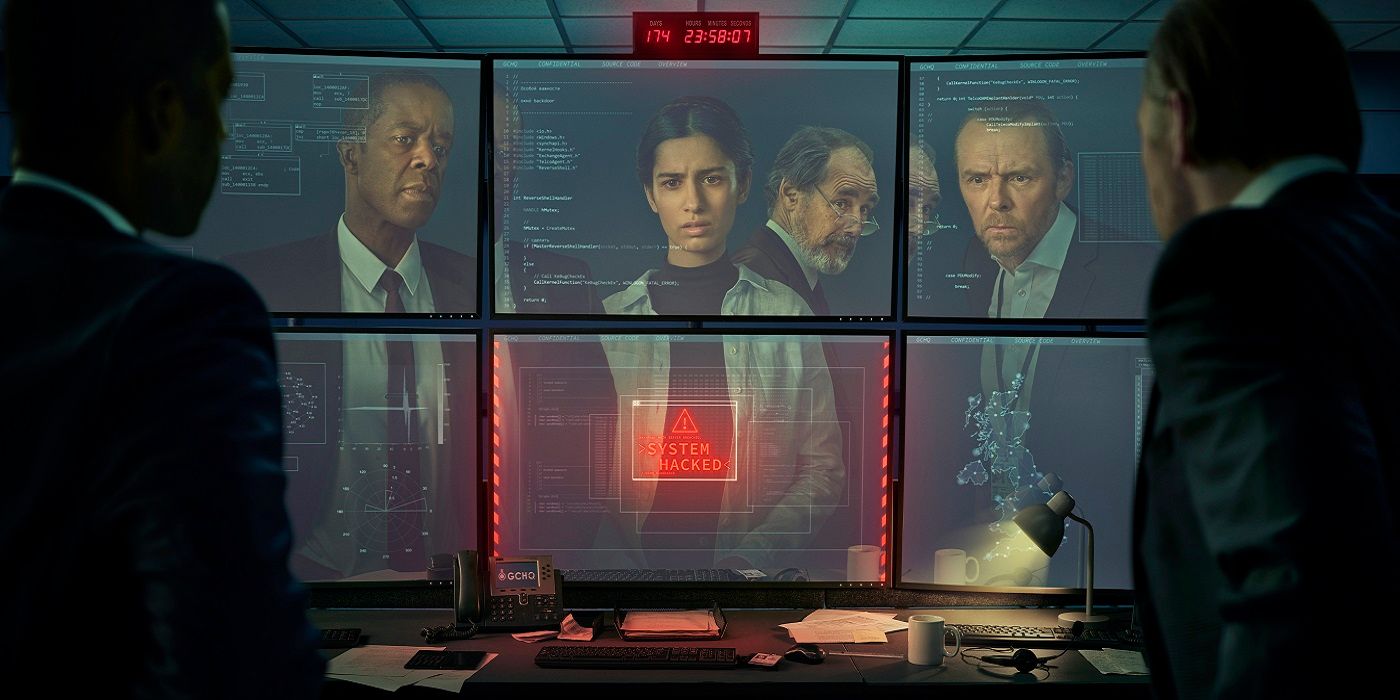The most significant conflict in The Undeclared War is the one the show is undertaking with itself. While the title refers to the specific type of confrontation between opposing powers where no official declaration of war is made, it could just as easily be about the story’s competing impulses that it never manages to resolve. Is it a political thriller about the fraught future of cyberwarfare? A drama about who gets caught in the digital crossfire? A statement about the way those in power further escalate geopolitical disputes for their own gain? It sporadically grasps at all of these potential themes yet never comprehensively excavates any of them, resulting in an experience that is both meandering and mundane. For every scene that feels a bit sharper, there are multiple that are painfully dull. For all the many contemporary connections it lays out, its superficial story remains largely detached and directionless.
The Undeclared War all begins with Saara Parvin (Hannah Khalique-Brown), a computer science student who has just begun a cybersecurity internship at the Government Communications Headquarters (GCHQ) in the near future of 2024 before an upcoming general election. A second-generation British Muslim, she keeps much of what she does separate from her family who has recently been hit with an unexpected loss. There is one moment where she is confronted about her being part of an organization that surveils their community, though this is just one of many narrative threads that are only barely explored and end up unraveling. Instead, we mostly see her working under the leadership of Danny Patrick (Simon Pegg) who is Head of Operations at GCHQ. When it is discovered that there has been a deliberate attack on the digital infrastructure of the UK, he will oversee the attempts to piece together what happened and prevent further escalation. Saara is thrown right into the middle of all this and ends up proving to everyone that she can see things others can’t. It makes for a promising enough start that still gets hopelessly lost in itself. Not only does it lack the necessary drama and tension to keep you engaged, it proves itself to be rather toothless in what it is setting out to say.
Early on, when Saara first arrives at the building where she will spend much of the story, she is informed that they are very glad to have her there as they are “hideously male, stale, and pale.” When she says that she hopes this isn’t why they picked her, it is brushed off and subsequently dropped almost entirely. Not only does this scene never get substantively explored in any meaningful way, it starts her journey off on a rather clunky and awkward note that becomes a defining trait of the rest of the show. It is always flagging potential ideas or themes for our attention, only to then deflate them as it turns its attention to something else. The third episode involves an extended flashback, throwing a lot out there about who the enemy really is, yet lacks the patience to dig into any of it. Despite having the longest runtime, it ends up feeling the most fleeting and insignificant when the rest of the series leaves it behind. While it gestures at making an observation about how this conflict is not as straightforward as it may initially seem, it ends up feeling buried under the more shallow narrative. Even as Pegg’s Patrick will frequently try to caution those in charge to not escalate things further and that there is potentially more going on to consider, the show mostly just steamrolls over him in a way that smothers anything that could be more deeply reflective. It all increasingly relies on narrative contrivances just to keep things moving along.
There is an attempt to be unconventional in its visual presentation, yet this ends up feeling more hokey than anything else. Most of this centers around when Saara is attempting to sort through the code, which the show seems unsure how to shoot in a way that is engaging. This is a challenge, though series like Mr. Robot have shown that you can do so creatively while still being focused on the grounded aspect of what is happening. The Undeclared War takes a different approach, making these sequences into strange ones where Saara will wander through visualizations of what is on her screen. It isn’t particularly consistent or compelling as it makes her do everything from sort through junk in a storage closet to stare at a floating cube. Think of the way we would see the mind palace in the Sherlock series but without any sense of whimsy or mystery to it. Making matters worse is that the show often feels rather flat, with lighting and framing that never feel immersive. Sure, boardroom conversations can be hard to make feel exciting, but this series just seems uninterested in trying. There are even moments with odd wide shots that seem hesitant to go in for close-ups even when the scene is crying out for it. It inexplicably and routinely undercuts the work of the committed cast.
One of the best examples of this is an underutilized Mark Rylance as the lonesome John Yeabsley, a GCHQ employee that Saara talks with when no one else will. The scenes they share feel like they could be getting at deeper character and thematic work, though that never crystallizes. Rather than get much of a storyline, he ends up mostly just existing to provide her with the information and perspective she needs before fading into the background. There are a few other characters floating around yet none of them stand out and often just serve as setups for tepid twists. Even for those who just want a stripped-down thriller, the show never really taps into that either. The idea of a more true-to-life look at what the future of cyberwarfare holds that eschews typical spy tropes could be interesting. The issue is that, if you’re going to dig into the realities of misinformation campaigns taking place online and the manipulation of truth more broadly, then do that without all the extra noise. Just when it seems like The Undeclared War may be cutting deeper beneath the surface of all this in its final episode, it reaches an odd cliffhanger of a conclusion. It comes far too late to be of much significance, making this short series one that will be gone from your memory just as quickly.
Rating: D+
You can watch all six episodes of The Undeclared War starting August 18 on Peacock.


